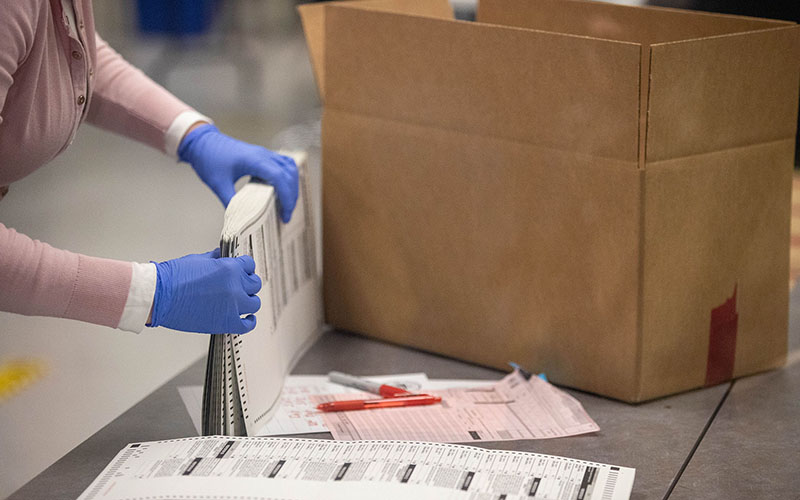With Maricopa County saying that it had finished its vote count, it appeared Monday that Arizona’s midterm had reached a milestone – no votes left to count – but the ordeal is far from over.
The races for Arizona’s superintendent of public instruction, attorney general and state representative for district 13 are headed for automatic recounts.
And some county election results won’t be certified immediately. Cochise County and Mohave County have delayed certification. The state’s 15 counties have until Nov. 28 to send their results to the Secretary of State’s Office. The results are considered unofficial until Dec 5.
In the biggest statewide squeaker – the race to become Arizona’s next attorney general – Democrat Kris Mayes led Republican Abe Hamadeh by a mere 510 out of more than 2.5 million votes cast.
Democrat Secretary of State Katie Hobbs maintained a 0.6% edge over former television anchor Republican Kari Lake in the race for governor.
The vote count came after officials in Arizona’s largest county, Maricopa, reported that more than 1.5 million votes had been cast. “This exceeded the historic average of 56.3% going back five decades,” the office tweeted.
The results follow a grueling campaign season that has riveted America’s political focus on Arizona.
That’s because Arizona, more than many other states, was viewed in many quarters as a litmus test for how candidates endorsed by former President Donald Trump, such as Lake, would fare. Lake and some other Republican candidates espoused Trump’s unproven claims of election fraud in 2020.
Arizona is also one of a dwindling number of “purple” states – with only slightly more registered Republicans than Democrats.
Now the focus will be on recounts – and any lingering allegations of voter fraud or election discounts.
In the superintendent race, Democratic incumbent Kathy Hoffman conceded against Republican Tom Horne. Hoffman tweeted out “After a hard-fought race, we came up short.” The race is still headed for an automatic recount, with Horne winning by a 0.36% margin.
In the state representative race for district 13, Jennifer Pawlik, a Democrat, leads, with the second and third finishers, Liz Harris and Julie Willoughby, both Republicans, separated by only 270 votes. The top two vote getters will be elected. District 13 currently covers parts of Maricopa and Yuma counties, but after redistricting will include only a portion of the East Valley.
Under Arizona law, if a candidate wins by a margin that is less than or equal to 0.5% of total votes cast, an automatic recount is activated. Previously it was 1%, but the law was changed this year.
“When the margin is close, the state conducts a recount regardless of whether any candidate or campaign petitions them to do so. And this is an important part of ensuring when an election is close, the state is declaring the right winner,” said Deb Otis, FairVote’s director of research, in a KJZZ interview.
FairVote, an election reform organization based in Maryland, found that recounts rarely change final results.
“In nearly 6,300 elections over the last 22 years, a recount has changed the outcome exactly three times – and the margin was well within 0.1% each of those three times,” Otis said.
In addition FairVote recommends that states automatically conduct statewide recounts up to a 0.1% margin as a best practice.
The governor race in Arizona, one of the tight races, has been at the forefront of national news. Lake alleged that some of her supporters were unable to cast ballots due to polling place snafus.
“Half of the voting centers that opened for the first time on Election Day (where the overwhelming majority of voters were voting for Kari Lake) were not operational or had significant failures,” the letter said.
This comes after 20% of Maricopa’s electronic vote tabulation machines malfunctioned. A judge on Election Day rejected a lawsuit filed by Lake, GOP U.S. Senate candidate Blake Masters and others asking that vote centers be kept open later.




